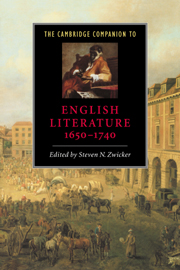1 - England 1649-1750
from Part 1 - Contexts and modes
Published online by Cambridge University Press: 28 May 2006
Summary
The century between the Civil War and the reign of George II saw the transformation of English political, social, and religious life. The scale of these changes may become apparent if we put our late twentieth-century selves into the picture for a moment. We would surely find mid seventeenth- century England strange and alien, violent, authoritarian, credulous, poverty-stricken; confident that virtue and responsibility were inherited by gentlemen and monarchs; cowering in the face of a hostile environment and universe; absorbed in a religious fundamentalism which included hairraising beliefs about salvation, other denominations, and the cosmic purpose of history. Mid eighteenth-century England, on the other hand, although not “modern,” would be full of familiar sights and institutions. For all its inexplicable addiction to the periwig, this was a world comfortingly like our own in many ways: with newspapers and tea-tables, concerts and public parks, insurance policies and sales taxes, a post office and bureaucrats; a world which held a place for “the ladies,” “the consumer,” “the citizen,” and “the middle class.” This society of shopkeepers and professional people valued diversity and regarded competition and social mobility as natural, yet it also respected politeness and restraint and feared “enthusiasm.”
- Type
- Chapter
- Information
- Publisher: Cambridge University PressPrint publication year: 1998



